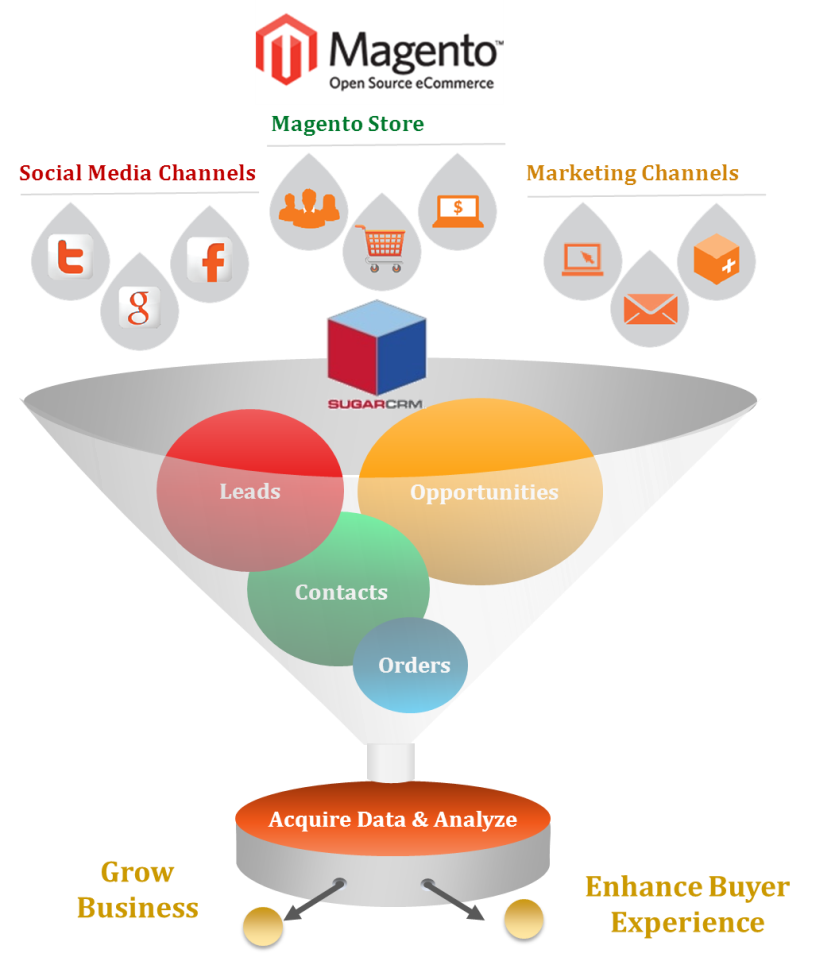It’s beyond doubt today that the popular e-commerce solution, Magento has many advantages. However, integrating Magento with a CRM program can bring even more exceptional benefits. Instead of running it in a stand-alone environment, it can be integrated with popular CRM systems such as SugarCRM or Salesforce to create a better infrastructure and an interactive front-end for a user to enjoy some complementary benefits.

Image Source : d3vncsohenrhbu
Here, we are enumerating the top 10 advantages of the Magento-CRM integration that everyone should know about:
1. Easy Integration: Magento allows an easy integration with CRM Systems. Using an API, one can access the database of a CRM and can use the system and its data to create a campaign. You may find various CRM’s which can be integrated in Magento at : Magento Connect
PixelCrayons can help you in integrating CRM system in your Magento Shop.
2. Front-end for Multiple Stores: Magento allows the creation of multiple online stores. With the integration of Magento with a CRM system, it is possible to administer all customer data from a single front-end. A CRM can synchronize all customer data across multiple nodes, allowing you to manage data from a single admin panel.
3. Automatic Data Synchronization: With the integration of Magento, there is no need to feed data manually into the CRM system. Thus, the Magento CRM saves from this time-consuming process. Besides, the manual data feeding is often prone to errors.
4. Better Data Management: When a store interacts with customers through multiple channels, a CRM allows you to manage the data in a better manner. After the data is built up, the integration and the data migration may prove difficult and may witness inaccuracies as well.
5. Bi-directional Synchronization: The integration of Magento with CRM enables a bi-directional synchronization of data between both the systems. When an order is placed on the store, the data is automatically updated in the CRM. This helps maintain the consistency of data and speeds up the data updating process.
6. Real-time Information Sharing: With the help of the CRM integration, Magento can fetch real-time data from different cloud platforms such as customer service, social network etc. This enables real-time information sharing about product price, delivery, customer support etc.
7. In-store Data Sharing: The Magento CRM allows the creation of a completely integrated retail management platform, allowing the CRM to fetch data from different departments of the store. This improves the efficiency and functioning of the online store.
8. Enhanced User Experience: When the data and information sharing is accomplished in an automated environment, it cuts down the manual efforts and enhances the user experience. At the same time, customers get the real-time and updated information that aids in their purchase decision making.
9. Better Customer Engagement: The CRM integration allows the store to offer customized deals to the customer based on his/her history or preferences. This allows a better customer engagement and also improves the sales prospect of an online store.
10. Improved Customer Service: The integration allows an online store to better serve its customers. With an automatic data update, the storefront remains aware of any changes made by the customer, such as the shipping address and delivers products at the right address. This improves the customer services and which adds to the reputation of an online store.
As a business, one should choose the right partner for Magento and integration services. PixelCrayons provides end-to-end magento ecommerce development services and ecommerce development solutions for all business verticals. The company follows Agile methodology and delivers quick results for the client.

